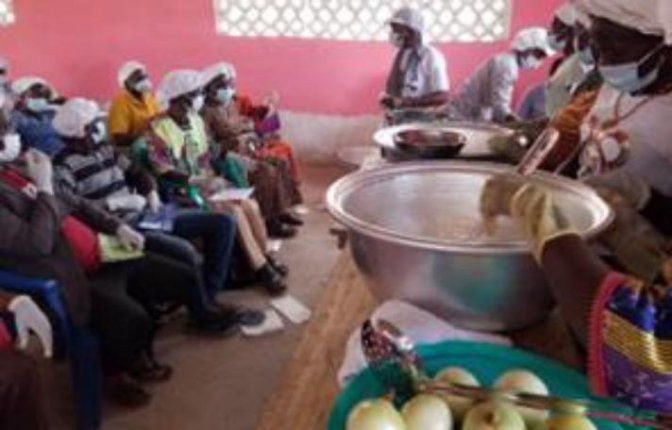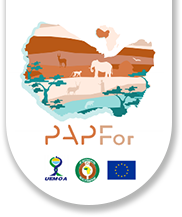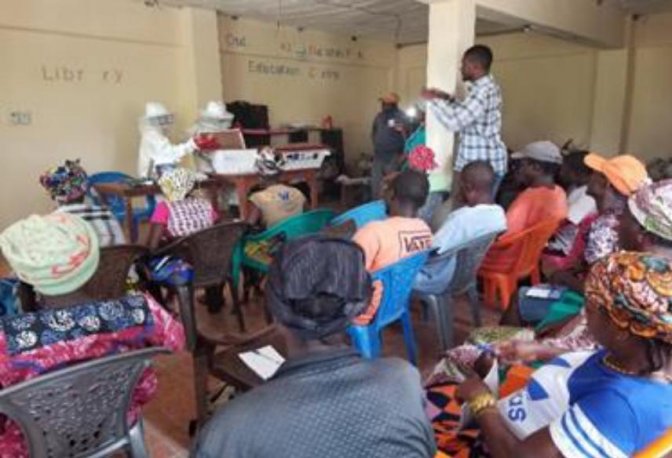Home / News / Training for communities around Outamba-Kilimi National Park
Training for communities around Outamba-Kilimi National Park
The Wild Chimpanzee Foundation (WCF), in collaboration with the Tacugama Chimpanzee Sanctuary (TCS), organised two capacity-building training sessions for 13 target communities in Outamba-Kilimi National Park (OKNP).
The training was held from 21 to 30 March 2023 to reinforce the capacities of farmers and beekeepers within Economic Interest Groups and to launch livelihood activities in Sierra Leone, to improve living conditions and promote the socio-economic emergence of populations living in the OKNP. This support is within the framework of the Outamba-Kilimi-Kuru Hills-Pinselli-Soyah (OKKPS) PAPFor project.
A two-day beekeeping training was organised by WCF from 23 to 24 March 2023 for members of two beekeeping cooperatives (out of four; Kothor and Yembere). In addition, TCS staff were trained in techniques for managing and monitoring beehives and for producing ecologically responsible honey. Twenty (20) members of the beekeeping cooperatives including 11 women gained greater knowledge of the beekeeping sector, based on four themes: (i) criteria for choosing and selecting a beekeeping production site, (ii) techniques for managing and monitoring hives, (iii) production of improved honey using Kenyan beehives, and (iv) techniques for harvesting the beehives and processing the honey.
Participants demonstrated the skills and knowledge gained in the form of practical exercises using equipment and materials intended for the practices of ecological beekeeping, notably the wearing of protective equipment, the use of a smoker, and the techniques of extraction and treatment of honey.
Two field visits were conducted in Kothor and Yembere at the end of the training and a beekeeping production site was selected in accordance with specific criteria (near a water source and plants for the bees to feed on, in an isolated and quiet area, etc.).

Meanwhile, the WCF team during a visit noticed that community members in Kothor usually cover their traditional beehives with rubber, which makes the hives uninhabitable for bees due to high temperatures, in addition to making them vulnerable to fires. WCF also observed a major problem in Yembere, where honey was being collected from hives without the use of any protective gear and which had resulted in the death of three people over the last two years. At the end of the field visit, two sites were selected for honey production in the two communities.
Subsequently, from 25 to 27 March, WCF organised a 3-day training in Fintonia for 38 members of four agriculture cooperatives (out of 10; Kabba-Fery, Kubaka, Kothor and Fintonia), including 22 women and TCS staff on sustainable agricultural practices.
The training was structured around three modules: (i) awareness raising about the importance of sustainable natural resource management for their livelihoods and future generations, (ii) introduction to different agroecological techniques such as Farmer-Managed Natural Regeneration (FMNR) that prescribes a certain density of trees is maintained and/or regenerated in cultivated fields, as trees aid in controlling erosion and in maintaining soil fertility through leaf litter decomposition, composting, erosion control measures such as stone barriers and the preparation of biopesticides, and (iii) storage and enhancing the value of agricultural products.
The impacts of certain harmful practices (slash-and-burn agriculture, use of chemical fertilisers, etc.) as well as the impact of climate change on crops were presented and discussed with the participants. The training was interactive and accompanied by several practical exercises.
In addition, the knowledge of the 38 community members was evaluated through a questionnaire before and after the training.
Following the training and to enable practical application of the training in agroecological practices, field visits were conducted in the four villages (Kabba-Fery, Kubaka, Kothor and Fintonia). The aim of the visit was to select demonstration FMNR fields following specific criteria: deep soil (10-45 cm), strong community commitment; low slope (≤ 15%), at least five years fallow, availability of tree species, and outside the fully protected area and high conservation value zone.
At the end of the mission, four FMNR fields were selected and the launch of the first FMNR activities commenced (cleaning and securing the fields and selecting the trees to be preserved).


